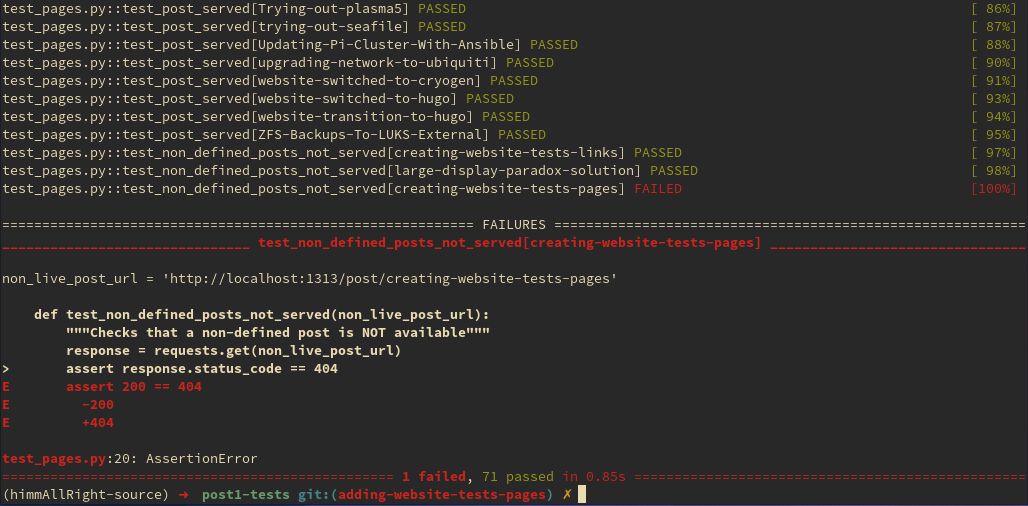Creating Tests For This Website - Pages

As this website grows, there is an increasing amount of complexity. More posts,
more images, and more links. I’ve gotten better at breaking work up into
separate branches (instead of pushing everything straight to master), but
even that isn’t enough to ensure everything works as expected when publishing
something new. Then, I thought of something obvious… I could setup some
simple testing… for my website.
What to Test
After editing a page or drafting a new post, I often wonder “how can I be sure everything will still work when I publish this change”? I question if every post file is actually being served as a web page. Or worse… I fear that a post that isn’t ready to be published might accidentally get pushed with an unrelated website fix.
(Yes, this is a completely unreasonable fear given that ALL of my website source files, drafts included, are publicly hosted on Github. Nonetheless, the fear exists)
This will be a multi-post serries, so in this first one we will focus on:
- Configuring the test environment
- Building up the testing framework
- Writing some basic tests to ensure:
- The pages I want to be served are
- Pages and posts that are not ready, are not being served
As my website is currently compiled using hugo, the tests will be centered around that framework. However, most of the information can be applied to testing websites using other static website generators, are they are all quite similar.
Setting up the env
I will be using
pytest for the testing
framework, and to make all the
python dependencies a bit easier to manage, I will also use
pipenv. Lastly, I usually work on a
Fedora computer, VM, or at the very least in a Fedora
podman container. So, some of my instructions use dnf,
but feel free to adjust to your package manager accordingly.
Install pipenv
First, lets install pipenv, which is easy enough in Fedora:
sudo dnf install pipenvInstall needed packages inside pipenv shell
After installing, create a pipenv shell and enter it:
pipenv shellInstall pytest and requests in the pip environment:
pip install pytest requestsCreating the Test Framework
With the environment setup, we can start building up the test framework. We
will start by defining come constants, then use those when building helper
functions. Lastly, we will use the helper functions to piece together the
conftest.py and test_pages.py files.
Defining Constants
First, lets define some constants we can use throughout the test framework. In the future, I might switch these to be set optionally with CLI arguments, but for now… they’re just static constant variables defined in a file.
So first, create a new file in the tests directory named constants.py. In
that file, lets dump our contants:
BASE_URL = "http://localhost:1313"
SITE_PAGES = ["/", "/pages/about/", "/pages/homelab/"]
POST_DIR = "./content/post/"
POST_NAMES = [
"25-days-of-c",
...
<Removed middle of list because it's long>
...
"ZFS-Backups-To-LUKS-External",
]As you can see, in my constants.py file I have 4 variables defined:
BASE_URL: this is the base url for the website when runninghugo serve. For most, it will default tohttp://localhost:1313, but I have this as a constant because I usually run myhugo servecommand with the-bto change it to an ip address so I can view it from other computers.SITE_PAGES: This is a list of paths that come after the baseurl for pages that we well be testing. For example, I want to make sure that my “about me” page is being served, which is atbaseurl/pages/about/, so/pages/about/is one of the values in this constant.POST_DIR: This is the directory for where the post files are located.POST_NAMES: This is a list of the names of the post files (without the.md)
Add in your values for the variables, and remember to save the file.
Writing Some Helper Utility Functions
With those constants defined, we should be ready to write some helper functions. These are normal python functions that will be called from tests or even test fixture functions.
First, lets create utils.py. The helper functions will need to use
listdir, as well as the path function from the os module. They will also
need the regex functions. So, lets make those imports at the top of the file:
from os import listdir, path
import reget_file_names
Lets define a helper function named get_file_names:
def get_file_names(src, extension=None):
"""Collects the names of all files of a directory"""
file_list = []
root_path = path.expanduser(src)
for file in listdir(root_path):
# If extension provided, check file has that extension
if extension:
if file.endswith(extension):
file_list.append(file)
# Otherwise, add everything
else:
file_list.append(file)
return file_listWhen provided a file path (src), this function will return a list of all the
file names in the directory. Optionally, the extension parameter can be
supplied to only return files of that extension type (for exapmple, md). This
function will be used to grab the names of all the post source files.
… and that’s all we need in utils.py… for now!
Conftest
Now lets start digging into test-related stuff, by first creating a
conftest.py file. This file will mostly hold the fixtures we will use for the
tests. In our particular setup, they will gather lists of pages to run multiple
calls of each test against by using @pytest.fixture(params).
But first, lets import a few things at the top of conftest.py:
import pytest
from os import path
from constants import BASE_URL, SITE_PAGES, POST_DIR, POST_NAMES
from utils import get_file_namesThe imports include the os.path() function, some of the constants we
defined, and the get_file_names() helper function. Oh, And of course
pytest ;) .
page_url
@pytest.fixture(params=SITE_PAGES)
def page_url(request):
"""Returns the page urls for testing."""
return BASE_URL + request.paramThe first fixture, page_url, is very basic. It creates a list of all of the
website pages (not posts), by combining the BASE_URL with each of the values
defined in the SITE_PAGES constant. This list will later be used to
paramaterize a single test across all of the page links.
post_url
@pytest.fixture(params=POST_NAMES)
def post_url(request):
"""Returns the post urls for testing."""
return BASE_URL + "/post/" + request.param.lower()The next fixture, post_url is basically the same as page_url, except it
creates a list of all the posts using the POST_NAMES constant. Again, this
will be used to expand a single test into many, one for each post.
non_live_post_url
@pytest.fixture(params=non_live_post_urls())
def non_live_post_url(request):
"""Returns the url of a non-defined post file"""
return BASE_URL + "/post/" + request.param.lower()Lastly, we have non_live_post_url with its accompanying helper function,
non_live_post_urls. This pair creates a list of posts that have a markdown
file in the /post/ directory, but are not listed in the POST_NAMES
constant (so in practice, not really to be published).
def non_live_post_urls():
"""Returns the urls of md files that should not be live."""
all_post_md_names = list(
map(lambda name: name.lower().split(".md")[0], get_file_names(POST_DIR))
)
live_post_names = list(map(lambda name: name.lower(), POST_NAMES))
non_live_post_names = set(all_post_md_names).difference(set(live_post_names))
return list(non_live_post_names)First, the non_live_post_urls helper function returns a list of non-listed
post files. That list is then used in non_live_post_url as the
pytest.fixture(params) object, much like SITE_PAGES and POST_NAMES were
for the previous
fixtures.
Finally… Some Tests!
Phew. Okay. With all of that defined… lets create the first test file. When
pytest runs, it will try to grab tests recursively from all the files down
the current directory, starting with test. This first set of tests will be
checking whether a web page is being served (or not), so lets name the file
test_pages.py. Again, start with the required imports. This time we only need
pytest and requests.
import pytest
import requestsTesting Pages
The first test will check that each page defined in the SITE_PAGES constant
is being served. More specifically, we will use the requests module to ensure
not only that the page is served, but returns a 200
status. This
actually requires very little code to accomplish (Gotta love python) :
def test_page_served(page_url):
"""Checks that the website pages are available"""
response = requests.get(page_url)
assert response.status_code == 200We simply define a function, test_page_served(), and because it is in
test_pages.py, it will be assumed to be a test by pytest. We provide the
page_url fixture we previously defined in conftest.py as the only
parameter. This will call the test_page_served test for each url
in the list generated by page_url. Next, we use requests.get() to make a
page request. Lastly, we assert that the status_code from our response is
200. If it is, the test passes, if not, it fails.
Testing Posts
Next, lets test that all of the posts are being served. This test works
exactly the same as test_page_served, except we are using the post_url
fixture instead of page_url to supply the links to test:
def test_post_served(post_url):
"""Checks that the desired posts are available"""
response = requests.get(post_url)
assert response.status_code == 200(While I could combine these cases into a single test function, I decided to keep them separate for flexibility in the future)
Lets Get Fancy: Testing Unapproved Posts Are NOT Served
For the last test, lets get a little bit more complicated and ensure that post files
not listed in the approved list are not being served. Well… it
turns out all the “fancy” code required for this test case already occured in
the non_live_post_urls helper function. The test function itself, is
essentially the same as what we’ve already encountered except that we are
now checking for a 404 return status instead of 200:
def test_non_defined_posts_not_served(non_live_post_url):
"""Checks that a non-defined post is NOT available"""
response = requests.get(non_live_post_url)
assert response.status_code == 404That defines all of the tests for this first set! Don’t let only having three test functions fool you, they should generate over 70 test results when run! (For my website, at the time of writing this post)
Lets Run Some Tests!
Finally, we should be able to run the tests. To do so, first ensure that you
are in the pipenv by running pipenv shell, or you can run the tests from
outside the pipenv using pipenv run COMMAND. Next, call:
pytest -v .The -v flag runs pytest in ‘verbose’ mode, which I like to do as it shows
the results for each test run, rather than each file.
Example video of tests running and passing
So it looks like all the tests are passing! To be sure, Lets do a quick check to
make sure they work as expected… I’ll mark this post with draft = "False",
but not add it to the approved lists, and the test for this page should
fail…

Awesome, it failed! I guess all there is left to do is to finish up this post, so I can add it to the approved posts lists and publish it! Stay tuned!